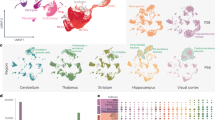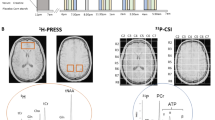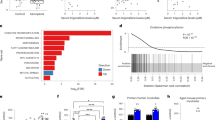Abstract
In rodents, the electroencephalogram (EEG) during paradoxical sleep and exploratory behavior is characterized by theta oscillations. Here we show that a deficiency in short-chain acyl-coenzyme A dehydrogenase (encoded by Acads) in mice causes a marked slowing in theta frequency during paradoxical sleep only. We found Acads expression in brain regions involved in theta generation, notably the hippocampus. Microarray analysis of gene expression in mice with mutations in Acads indicates overexpression of Glo1 (encoding glyoxylase 1), a gene involved in the detoxification of metabolic by-products. Administration of acetyl-L-carnitine (ALCAR) to mutant mice significantly recovers slow theta and Glo1 overexpression. Thus, an underappreciated metabolic pathway involving fatty acid β-oxidation also regulates theta oscillations during sleep.
This is a preview of subscription content, access via your institution
Access options
Subscribe to this journal
Receive 12 print issues and online access
$209.00 per year
only $17.42 per issue
Buy this article
- Purchase on Springer Link
- Instant access to full article PDF
Prices may be subject to local taxes which are calculated during checkout




Similar content being viewed by others
References
Vanderwolf, C.H. Hippocampal electrical activity and voluntary movement in the rat. Electroencephalogr. Clin. Neurophysiol. 26, 407–418 (1969).
Larson, J., Wong, D. & Lynch, G. Patterned stimulation at theta frequency is optimal for the induction of long-term potentiation. Brain Res. 368, 347–350 (1986).
Winson, J. Loss of hippocampal theta rhythm results in spatial memory deficit in the rat. Science 201, 160–163 (1978).
Mizumori, S.J, Perez, G.M, Alvarado, M.C., Barnes, C.A. & McNaughton, B.L. Reversible inactivation of the medial septum differentially affects two forms of learning in rats. Brain Res. 528, 12–20 (1990).
Maquet, P. The role of sleep in learning and memory. Science 294, 1048–1052 (2001).
Vertes, R.P. & Eastman, K.E. The case against memory consolidation in REM sleep. Behav. Brain Sci. 23, 867–876 (2000).
Vertes, R.P. & Kocsis, B. Brainstem-diencephalo-septohippocampal systems controlling the theta rhythm of the hippocampus. Neuroscience 81, 893–926 (1997).
Franken, P., Malafosse, A. & Tafti, M. Genetic variation of EEG activity in inbred mice. Am. J. Physiol. 275, R1127–R1137 (1998).
Huang, E.P. Synaptic plasticity: a role for nitric oxide in LTP. Curr. Biol. 7, R141–R143 (1997).
Datta, S., Patterson, E.H, & Siwek, D.F. Endogenous and exogenous nitric oxide in the pedunculopontine tegmentum induces sleep. Synapse 27, 69–78 (1997).
Guerra, C. et al. Abnormal nonshivering thermogenesis in mice with inherited defects of fatty acid oxidation. J. Clin. Invest. 102, 1724–1731 (1998).
Reue, K. & Cohen, R.D. Acads gene deletion in BALB/cByJ mouse strain occurred after 1981 and is not present in BALB/cByJ-fld mutant mice. Mamm. Genome 7, 694–695 (1996).
Wood, P.A. et al. Short-chain acyl-coenzyme A dehydrogenase deficiency in mice. Pediatr. Res. 25, 38–43 (1989).
Schiffer, S.P et al. Organic aciduria and butyryl-CoA dehydrogenase deficiency in BALB/cByJ mice. Biochem. Genet. 27, 47–58 (1989).
Amendt, B.A, Freneaux, E., Reece, C., Wood, P.A. & Rhead, W.J. Short-chain acyl-coenzyme A dehydrogenase activity, antigen, and biosynthesis are absent in the BALB/cByJ mouse. Pediatr. Res. 31, 552–556 (1992).
Bhala, A. et al. Clinical and biochemical characterization of short-chain acyl-coenzyme A dehydrogenase deficiency. J. Pediatr. 126, 910–915 (1995).
Kurtz, D.M. et al. Targeted disruption of mouse long-chain acyl-CoA dehydrogenase gene reveals crucial roles for fatty acid oxidation. Proc. Natl. Acad. Sci. USA 95, 15592–15597 (1998).
Rao, K.V. & Qureshi, I.A. Decompensation of hepatic and cerebral acyl-CoA metabolism in BALB/cByJ mice by chronic riboflavin deficiency: restoration by acetyl-L-carnitine. Can. J. Physiol. Pharmacol. 75, 423–430 (1997).
Bieber, L.L. Carnitine. Annu. Rev. Biochem. 57, 261–283 (1988).
Liu, J. et al. Memory loss in old rats is associated with brain mitochondrial decay and RNA/DNA oxidation: partial reversal by feeding acetyl-L-carnitine and/or R-alpha-lipoic acid. Proc. Natl. Acad. Sci. USA 99, 2356–2361 (2002).
Thornalley, P.J. Glutathione-dependent detoxification of alpha-oxoaldehydes by the glyoxalase system: involvement in disease mechanisms and antiproliferative activity of glyoxalase I inhibitors. Chem. Biol. Interact. 111-112, 137–151 (1998).
Korotkova, N., Chistoserdova, L., Kuksa, V. & Lidstrom, M.E. Glyoxylate regeneration pathway in the methylotroph Methylobacterium extorquens AM1. J. Bacteriol. 184, 1750–1758 (2002).
Oldendorf, W.H. Carrier-mediated blood-brain barrier transport of short-chain monocarboxylic organic acids. Am. J. Physiol. 224, 1450–1453 (1973).
Spitzer, J.J. CNS and fatty acid metabolism. Physiologist 16, 55–68 (1973).
Reichmann, H., Maltese, W.A. & DeVivo, D.C. Enzymes of fatty acid beta-oxidation in developing brain. J. Neurochem. 51, 339–344 (1988).
Franken, P., Malafosse, A. & Tafti, M. Genetic determinants of sleep regulation in inbred mice. Sleep 22, 155–169 (1999).
Muller, P.Y., Janovjak, H., Miserez, A.R. & Dobbie, Z. Processing of gene expression data generated by quantitative real-time RT–PCR. Biotechniques 32, 1372–1379 (2002).
Manly, K. & Olson, J. Overview of QTL mapping software and introduction to Map Manager QT. Mamm. Genome 10, 327–334 (1999).
Acknowledgements
We thank J. Vockley for providing the ACADS antibody; J. Garcia-Sevilla, M. Ferrer Alcon, C. Walzer and B. Pastori for help in immunoblot assays; P. Descombes, M. Docquier and O. Schaad for assistance in microarray and real-time RT–PCR analyses; A. Malafosse, N. Gregersen and S. Ghisla for discussions; and J. Flint and U. Schibler for critical reading of our first drafts. M.T. was supported by the Swiss National Science Foundation and the Geneva University Hospitals. P.A.W. and P.F. were supported by grants from the National Institutes of Health (the Center for Research Resources and the Heart, Lung, and Blood Institute, respectively). M.T. and P.F. were also supported by a grant from Roche Research Foundation.
Author information
Authors and Affiliations
Corresponding author
Ethics declarations
Competing interests
The authors declare no competing financial interests.
Rights and permissions
About this article
Cite this article
Tafti, M., Petit, B., Chollet, D. et al. Deficiency in short-chain fatty acid β-oxidation affects theta oscillations during sleep. Nat Genet 34, 320–325 (2003). https://doi.org/10.1038/ng1174
Received:
Accepted:
Published:
Issue Date:
DOI: https://doi.org/10.1038/ng1174
This article is cited by
-
Fresh Washed Microbiota Transplantation Alters Gut Microbiota Metabolites to Ameliorate Sleeping Disorder Symptom of Autistic Children
Journal of Microbiology (2023)
-
Cerebral Metabolic Changes During Sleep
Current Neurology and Neuroscience Reports (2018)
-
A variant at 9q34.11 is associated with HLA-DQB1*06:02 negative essential hypersomnia
Journal of Human Genetics (2018)
-
Short chain acyl-CoA dehydrogenase deficiency and short-term high-fat diet perturb mitochondrial energy metabolism and transcriptional control of lipid-handling in liver
Nutrition & Metabolism (2016)
-
Neurexin regulates nighttime sleep by modulating synaptic transmission
Scientific Reports (2016)



